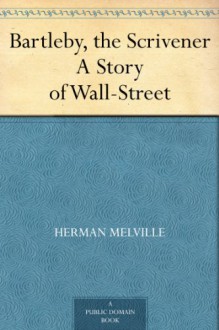Bartleby, the Scrivener A Story Of Wall-Street
This book was converted from its physical edition to the digital format by a community of volunteers. You may find it for free on the web. Purchase of the Kindle edition includes wireless delivery.
This book was converted from its physical edition to the digital format by a community of volunteers. You may find it for free on the web. Purchase of the Kindle edition includes wireless delivery.
show less
Format: kindle
ASIN: B00849BXY6
Pages no: 70
Edition language: English
Category:
Classics,
Academic,
School,
Literature,
Read For School,
American,
Classic Literature,
Literary Fiction,
19th Century,
Short Stories,
Fiction

I read "Bartleby the Scrivener" as I was told it was a good introduction to Herman Melville because it was short, accessible and showed how ahead of his time Melville was. All of those things turned out to be true but especially the last. "Bartleby The Scrivener" was published in 1853, the same ...

No one told me it was a comedy, or I might have read it sooner. It was very easy to imagine the story illustrated by Edward Gorey.Actually, Veronica told me that Melville wrote this as his response to everyone asking him to write a sequel to Moby Dick. Going into it with the idea of Cartman saying "...

“I would prefer not to.” I’ve seen this phrase all over the bookish internet: on totes, mugs, t-shirts. Bartleby’s refrain always struck me as petulant. It reminds me of a kid whose parents have just asked them to do their chores. I would prefer not to do the dishes. The response to this usually som...

I feel guilty not giving this a five. I recently used Bartleby as a write-in candidate in a poll for U.S. president, based strictly on his reputation of saying "I prefer not to..." I prefer not to tell you one spurious claim about Bartleby's "problem", this time on Wikipedia, since the theory mixes ...

Loved this one. I was surprised by how funny Melville could be, which Moby Dick's slight touches of the ironic (church sermon, etc.) wouldn't really suggest. I would like to re-read this with more focus on the narrator: why does he allow Bartleby to stick around so long? Does his reluctance betray a...






 9 years ago
9 years ago